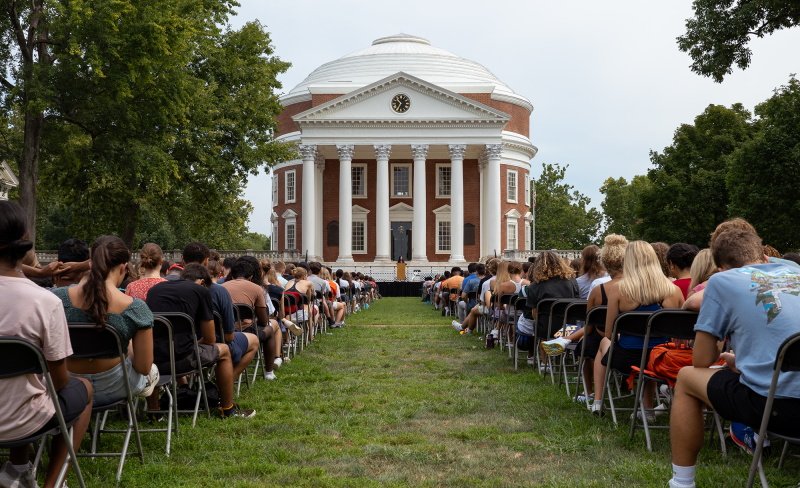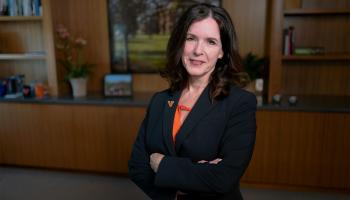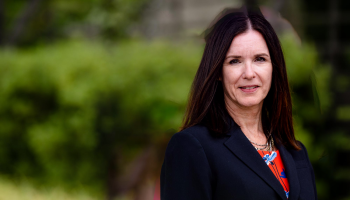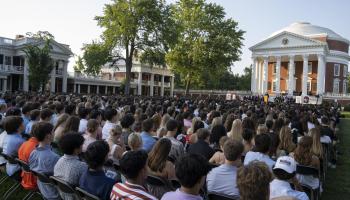“Use your superpower to gather”: an interview about Dean Acampora’s message to First Years

On Aug. 21, the day before the start of fall semester classes, Arts & Sciences Dean Christa Acampora revived one of the College’s traditions. That morning on the Lawn, she delivered the First Lecture to incoming first years and transfer students.
It was the first time, since before the pandemic, that an A&S Dean had the opportunity to address, in person, the College’s incoming students and to share the Dean’s perspective on what the next four years hold in store for them on Grounds. Acampora began her appointment as Dean last fall after the 2022-23 academic year had already begun, so she used her “first” First Lecture as a chance to discuss the superpower she believes incoming students might not even realize they have.
Q: You talked to the students about seizing their “superpower.” What is that exactly?
Acampora: It is what I’m calling the superpower of gathering. Throughout history, people have achieved great things by coming together. It is also the case that we create our communities by gathering. In gathering for a purpose, a community becomes greater than the sum of its individual members. That’s a key ingredient of what makes UVA so special—it is good at creating opportunities for gathering. I wanted students to realize that from the start so that they can take advantage of it, contribute and enjoy the benefits of being part of that.
Q: What inspired you to focus on that theme?
Acampora: I started to work on my lecture on the Fourth of July. Because I was in the Arctic Circle on vacation, there were no celebrations for me to join. So, I was thinking about how we are coming up on the 250th anniversary of the Declaration of Independence and many stories that are connected with that. That led me to reflect on the beginning of the Declaration of Independence: "We the people…” It made me think about who that “we” was and what was accomplished with the Declaration. Those words gathered a nation, bringing something new into existence. That’s something extraordinary.
Q: How do you define that ‘we’ in terms of your First Lecture audience?
Acampora: Invoking that “We” was not just a reference to the people who signed the Declaration of Independence. In uttering “we,” the Declaration of Independence creates something new; it gathers. Of course, the vision of who is included— not only in word but also in fact —has been and continues to be a source of contention. That struggle is in many ways a defining feature of this country. Nevertheless, we can use this idea of gathering a “we” as a launching point to reflect on the truly distinctive opportunity that you — WE, all of us—have in finding ourselves connected here and in this place.
Q: In your lecture, you talked about some different senses of the word ‘We’. What did you mean by that?
Acampora: The word ‘we’ has several functions: sometimes it refers, and sometimes it performs. It refers when it just means ‘us’ or some specific group. When it performs, there is immense power in the capacity of this word to convene, to draw people together in gathering. ‘We’ can refer to a group of people and it can constitute a new group.
Q: You gave students some examples of what kind of power can be had in coming together in various types of gatherings. Could you say a few more words about that?
Acampora: There are endless forms of gathering in human society that create distinctive kinds of community. For example, some rituals within the Jewish faith require a gathering of believers known as a minyan. Minyans do not require the presence of a rabbi, but even without a rabbi’s participation, minyans are regarded as attracting the Divine Presence; to gather is to draw G-d near. In this case, because some have gathered, divinity is present.
“Ring shouts” are another powerful kind of gathering. They took place in Praise Houses, which brought together people who were enslaved laborers, originally on the plantations where they were held captive. Ring shouts were ecstatic performances that provided people ways to express themselves through music and dance and to realize senses of connection and experiences of freedom. In these gatherings, people formed a we that enabled a different form of existence.
Q: How does your idea of the superpower of gathering connect with your ideas of belonging that you shared with incoming students?
Acampora: Many people associate belonging with the ability to fit in or be accepted within a group. Often people think of belonging as a kind of feeling you have. I see it as also including something more than that. When people belong, they participate in making a place or a community or an organization what it is. They participate in the gatherings that define the place. So, I invited the new students to think of the Academical Village that is the University of Virginia as a special place for gathering where students, professors and other members of the University community are brought together in ways that shape them and the community at large.
Q: How has UVA’s role as a special place for gathering evolved?
Acampora: Thomas Jefferson’s vision for a new, distinctive institution of higher learning was built around certain forms of ‘we’ that it could and would convene. There were certainly many people who were left out of that vision. Over the course of two centuries, however, this university has evolved and expanded opportunities for gathering here; as a University community, we are much larger, more diverse and cosmopolitan. I also think the university of today more closely reflect Jefferson’s educational ideals for this nation’s first liberal arts university.
So, as we gather as a University community, we create new possibilities for ourselves as individuals and for others gathered with us. These are the times when people come together and create a we that is altogether new, to pursue a goal that is larger than any one of our individual aspirations. It truly is a superpower.
Q: What was your advice for students on how to apply that superpower in the days, weeks, and months ahead of them as they’re making friends, joining student organizations and adjusting to college life?
Acampora: I urged them to keep this superpower of gathering in mind whenever they have opportunities to connect and engage with others at UVA. Especially at the start of the school year, it’s important to remind our ambitious and talented students that they don’t have to pursue every leadership position they can, win every competition, or get in the mix of every social organization. They should also take advantage of opportunities to gather and connect—and there’s immense power in that.
Instead, I told them they shouldn’t see alternatives to leadership as simply or only following. When they use their superpower of gathering, they are shaping the community that makes UVA what it is.
Q: And that’s something that they can do to experience belonging?
Acampora: That’s exactly right. Showing up in this way will not only have the effect of making students feel like they belong — which can be a tremendously powerful experience in itself — but it will, in fact, make them belong because they will be contributing to making this place what it is. When they think about what it means to be part of the community at UVA, I want our students to think about how simply by gathering, they will make this place what it is now, as well as what it will be and become in the future.
Q: How does UVA support that environment where students with so many different experiences and backgrounds can embrace that communal sense of belonging?
Acampora: When I think about what belonging means to me, it includes having my stories woven into the stories of the places and peoples to whom and with which I belong. Sharing and listening to each other's stories is part of this effort. This doesn’t mean it is a singular, unbroken, harmonious narrative, or that we all share the SAME story. I think one measure of the strength of a community might be its integrity in storytelling of this sort — that is, the extent to which it can bear integrating stories with seemingly discordant or contradictory elements.
Q: How has your personal experience at UVA since your arrival last fall shaped this idea of belonging and its importance?
Acampora: I’m still new to this community, and I have much to learn. But I have observed something distinctive about UVA and how belonging happens here. It is a place where people speak openly and often about love and an aspiration for a loving community, even as people acknowledge the journey to that goal is not complete. It is a community that relishes mirth — this is a place that gathers to make and have fun! I don’t take that lightly.
Communities that can create opportunities for shared joy are often strong and vibrant, creative and supportive. But none of this happens simply by accident or only through tradition. It happens in communities when and because the conditions are created for people to come together to become something more than simply the sum of its parts.
That’s the nature of UVA’s invitation to its students: to join this community, to gather and convene here — to learn, to love, to explore, discover and create.
Q: You delivered the First Lecture on the Lawn, with the Rotunda serving as a unique historical backdrop. As the University values its historical traditions, what was your concluding message to students related to their role in continuing to expand and shape this community’s sense of belonging?
Acampora: The University of Virginia arose from an extraordinary set of historical circumstances, and it remains a truly extraordinary place. As I told our students, it is not a perfect place, by any means, but it is one that you will hear university leaders say aspires to be a “Great and Good” university. The University is what it is because of the people who have belonged here, because of the very many people who have contributed to its shaping to meet the needs of a changing world.
And that’s the challenge I offered our new students. They are part of this University’s incredible experiment in public, democratic education. In seizing and using their superpower to create and be part of the distinctive gatherings here — they will contribute to what makes this such a truly remarkable institution. They will shape it and make it what it will be during the time they are here on Grounds and whatever it may be in the future.







